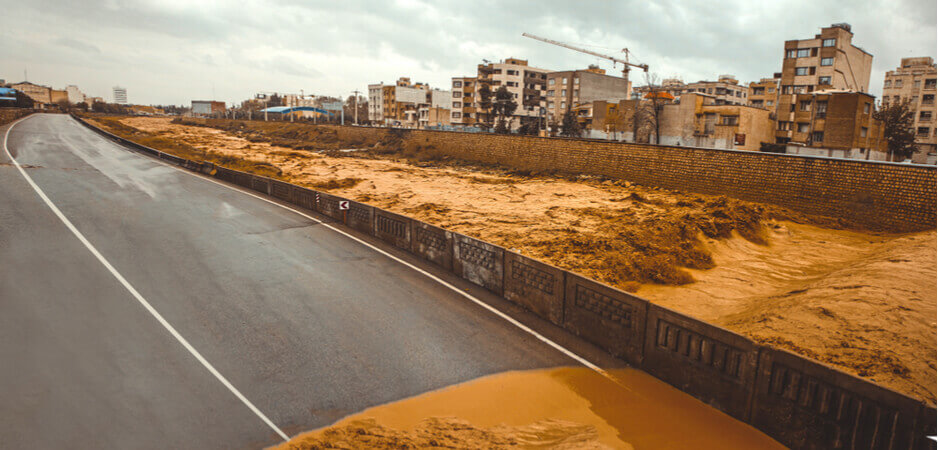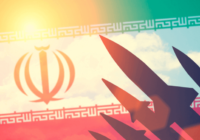The IRGC is exploiting the recent floods in Iran to tighten its grip while suppressing any dissent that might emerge out of the current situation.
Over the past two weeks, nearly every province in the Islamic Republic of Iran has been devastated by flooding. Official reports have acknowledged the deaths of at least 70 people, but it bears noting that these figures come after the Iranian regime disputed the initial local announcements of fatalities in certain areas. It is widely believed that the actual death toll is much higher, and that Tehran has been working to downplay the impact of the disaster in order to shield itself from some of the inevitable criticism of an incompetent government response and long-term ecological mismanagement.
In a larger sense, the flooding has become a showcase for the regime’s misplaced priorities and contempt for its own people. President Hassan Rouhani became the focus of criticism by Iranian social media users as well as the international community after it took him nine days to visit flood-ravaged localities. Even after he finally made the trip, the Rouhani administration could not help but use the occasion to breathlessly condemn foreign adversaries, blaming the devastation on “economic terrorism” by the United States while making no reference whatsoever to the repeated mistakes in domestic policy that led to this situation.
Some hardline figures went well beyond merely drawing connections between the inadequate disaster relief efforts and the US sanctions that were reimposed last year after US President Donald Trump withdrew from the Iran nuclear deal. For instance, the Tasnim News Agency, an outlet with close ties to the Iranian Revolutionary Guard Corps (IRGC), chose to peddle a bizarre conspiracy on the backs of flood victims, declaring vaguely that “There are reasons for the heavy rains and flooding impacting Iran in recent days: They are the fruit of foreign climate manipulation.”
Of course, Iran’s independent media and the global press are focusing on much more sane and sensible explanations for the extent of the destruction that has been witnessed in recent days. Among the clear contributing factors are the decision by government agencies and private sector affiliates of the IRGC to construct homes and other buildings alongside waterways, as well as the long-term IRGC-led series of dam construction projects that took place without regard for ecological impacts and rarely included proper management of either the structures or the rivers on which they are built.
The IRGC’s dominance of the construction industry — together with a total lack of government oversight — has reportedly contributed to worsening drought over the years and to the drying of long-established and vitally important waterways like Lake Urmia. In the wake of those trends, government authorities should have been prepared to manage any sudden onslaught of precipitation that brought the latest drought to an end. But Tehran appeared to be taken completely by surprise, as evidenced by the president’s long absence from flood zones.
To be clear: US sanctions were not a meaningful factor in the aftermath of the flooding. The sanctions already allow appropriate exceptions for humanitarian goods. The White House made this clear in the wake of last year’s judgment by the International Court of Justice ordering the lifting of any sanctions that might exacerbate humanitarian crises in the Islamic Republic. But short of barring the entry of food and medicine into Iran, there is little that the international community could do to have an effect.
In fact, if anything is going to improve the humanitarian situation in Iran — whether in the aftermath of natural disasters or at any other time — it will be the application of vigorous economic and diplomatic pressure by foreign entities, for the sake of breaking the IRGC’s stranglehold on Iranian society.
Spokespeople for the hardline paramilitary organization would have Iranians believe that it is contributing to the recovery effort in the wake of the flooding. But in reality, the IRGC is exploiting the floods to tighten its grip while suppressing any dissent that might emerge out of the current situation. The fear of such expression of dissent is still running high, nearly a year and a half after the outbreak of nationwide protests that stretched the regime’s repressive capabilities to breaking point. This countrywide upheaval clearly demonstrated the people’s widespread awareness of their own government’s incompetence. As such, protesters roundly rejected Tehran’s efforts to shift blame for the economic crisis and various social ills on to “enemies” in the US and Europe. “Our enemy is right here,” activists have been heard to chant in reference to the theocratic dictatorship, “they lie when they say it’s America!”
There is no reason to suppose the regime will be more successful in turning people’s hatred against the Western world after the recent flooding, especially if those people witness an opportunistic and misdirected government response first hand. And even if they don’t, the country’s population is well aware of the overall situation that has emerged out of 40 years of fundamentalist rule. This was highlighted amidst the flooding by Maryam Rajavi, the president-elect of the National Council of Resistance of Iran, who said via Twitter: “The mullahs have made our country defenseless against natural incidents by destroying the environment, deforestation, skyrocketing embezzlements, and wasting the country’s wealth on suppression, terrorism and wars.”
The ultimate solution for Iran’s beleaguered people will only come when there is a democratic government in place in Iran. Until then, one way to counter the devastating effects of the recent floods and other natural disasters is national solidarity now growing among the population.
The views expressed in this article are the author’s own and do not necessarily reflect Fair Observer’s editorial policy.
Support Fair Observer
We rely on your support for our independence, diversity and quality.
For more than 10 years, Fair Observer has been free, fair and independent. No billionaire owns us, no advertisers control us. We are a reader-supported nonprofit. Unlike many other publications, we keep our content free for readers regardless of where they live or whether they can afford to pay. We have no paywalls and no ads.
In the post-truth era of fake news, echo chambers and filter bubbles, we publish a plurality of perspectives from around the world. Anyone can publish with us, but everyone goes through a rigorous editorial process. So, you get fact-checked, well-reasoned content instead of noise.
We publish 2,500+ voices from 90+ countries. We also conduct education and training programs
on subjects ranging from digital media and journalism to writing and critical thinking. This
doesn’t come cheap. Servers, editors, trainers and web developers cost
money.
Please consider supporting us on a regular basis as a recurring donor or a
sustaining member.
Will you support FO’s journalism?
We rely on your support for our independence, diversity and quality.





